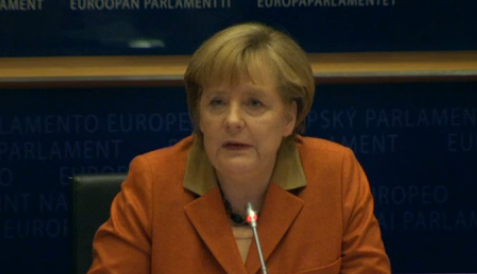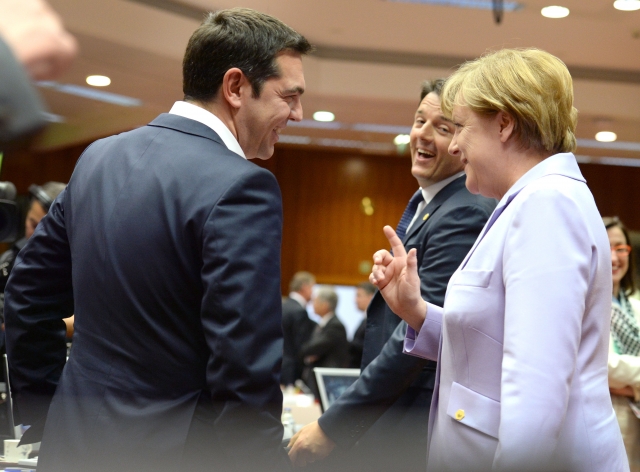Europe is domestic politics. Angela unsettles MEPs...

(BRUSSELS2) By coming to the European Parliament in Brussels today, the German Chancellor wanted to set the stage for a convinced European. “Europe is all of us together. Europe is domestic politics. Together we can create a Europe of stability and power hammered Angela Merkel. (Europa, das sind wir alle gemeinsam. Europa - das ist Innenpolitik. Gemeinsam können wir ein Europa der Stabilität und Stärke schaffen) In doing so she placed herself in the footsteps of her predecessors, Konrad Adenauer or Helmut Köhl. Which was not very obvious given the German position in recent months. " The euro is much more than a currency. " He is " the symbol of the successful peaceful and democratic unification of Europe, the symbol of a Europe of freedom, prosperity and progress She said.
But the Chancellor also took the opportunity to hammer home her own ideas. This marks - when we examine the different proposals - certain points of rapprochement with France but also singular differences. As well as with the members of the European Parliament (in particular on the role of the national parliaments) that she seems to have particularly irritated (on the right too!).
4 axes of development
The German Chancellor called for a European leap towards 4 axes: “ a common financial market policy, a common fiscal policy, a common economic policy (and) more democratic legitimacy and control”. In particular, it wants to provide the European level with a " real power to intervene on national budgets if agreed Stability and Growth Pact limits are not met ". And for that, it is ready for a change in the treaties. " We must be ambitious and demanding and not hesitate to change the contractual basis of Economic and Monetary Union, if necessary. »
National parliaments called upon to play a greater role
Angela Merkel thus called for a " strengthening the dialogue between national parliaments and members of the European Parliament”. This will allow national parliaments to exercise their functions in the new arrangement which will also see the European institutions strengthened in their ability to decide on national budgets. To achieve a " real exchange between European and national level ", the Chancellor intends to set up " a new multilevel and differentiated procedure ". " In this case, Member States should conclude, with the approval of their parliaments, binding and enforceable agreements with the reform at European level. So she added: National parliaments will increasingly exercise - as well as governments for that matter - their responsibility for mainstreaming ».
MPs not very happy: the threat of the Court of Justice
These proposals were received differently. For the Frenchman Joseph Daul, the leader of the European People's Party (which includes Angela Merkel's CDU/CSU), expressed his perplexity in the face of the contradictory position of the Member States: " Reducing the main European budget to create a new mini-European budget, what does that mean? We are not able to finance the main budget, how can we finance a second one? Common sense peasant, my logic do not allow me to understand such a thing. And so I will ask Parliament to go to the European Court to understand ». And to add: the euro is the currency of the European Union, and the European Parliament is the parliament of the European Union. The European Parliament is therefore also the parliament of the euro zone: “We do not need new institutions or a budget specific to the Euro zone.”
The speech was not so much better received in the Liberal and Democratic group. For its president, the Belgian liberal Guy Verhofstadt, " The real problem in the euro zone is more political than economic. The examples of the United States and Japan - both with higher debts but lower borrowing costs than the eurozone - prove that a currency must be backed by consistent policy, accountable authority and a ambitious federal budget. »
NB: Strasbourg left aside
It will be noted that the Chancellor spoke before the European Parliament... in Brussels and not in Strasbourg. Question of agenda no doubt. But symbolic presence: the Alsatian capital is not or no longer the unique sign of the Franco-German reconciliation so described, at least on the west bank of the Rhine. Admittedly, she did not speak in "plenary" but before the "conference of presidents open to all deputies" (and to the press). This makes it possible to respect certain forms and certain respects. But that amounts to the same in practice.


